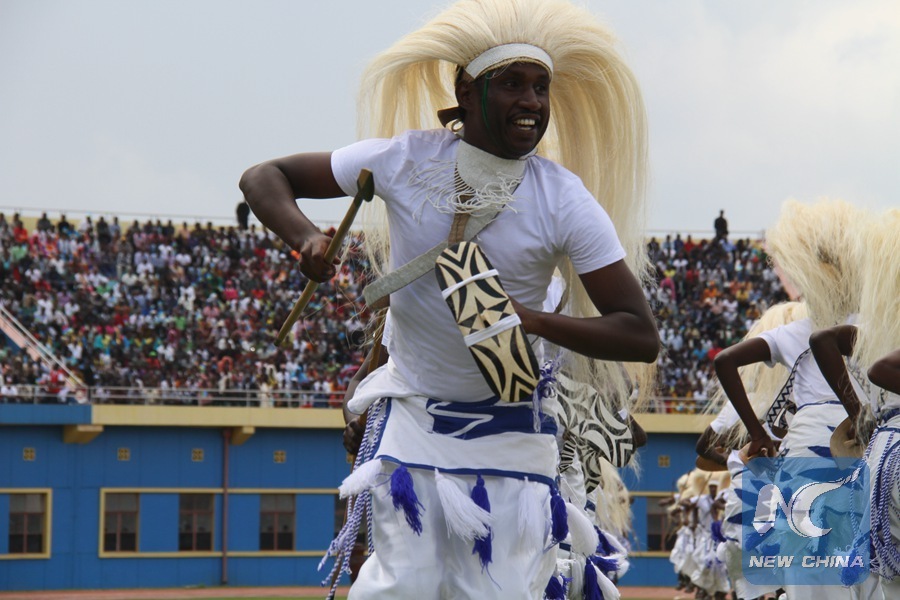
Rwandan artists dance at the Paul Kagame's inauguration ceremony in Kigali, capital of Rwanda, on Aug. 18, 2017. Paul Kagame on Friday was sworn in as president of Rwanda for his third term in Kigali. (Xinhua/Lyu Tianran)
KIGALI, Sept. 20 (Xinhua) -- A senior Rwandan media official has called on local media to tell their own story about Rwanda as foreign media often portray Rwanda's image in prejudiced and negative terms.
Gerald Mbanda, Head of Media Affairs and Communication Department at the Rwanda Governance Board, spoke to Xinhua in an exclusive interview about Rwanda's image in local and foreign press.
RGB has been able to promote media development in the country ensuring that the national media policy is implemented to achieve a highly performing and sustainable media industry, serving as a key driver of the country's development, said Mbanda, whose mission is centered on promoting professionalism in the media industry in Rwanda.
"Foreign media often portray Rwanda's image in prejudiced and negative terms. What they report about is not a true reflection of what is happening on the ground. When it comes to western media, particularly, nothing positive comes out of Rwanda," he said.
For instance, in the last presidential elections, many international media said there was climate of fear in Rwanda. However, the opposite was happening in Rwanda. The elections reflected mood of jubilation and climate of cheer, which needs to be reported by local media to disapprove biased reporting of some international press, said Mbanda.
Rwanda was ranked as a media freedom country in 1993 by American watchdog organization Freedom House when the central African country was burning with hate propaganda by local media houses that promoted ethnicity and genocide, he added. "If this is what they call media freedom, a country like Rwanda would not need this freedom," he said.
"Foreign media always have their own agenda which is different from what is happening in Rwanda. Usually there is a big disappointment in the coverage of the foreign media when they try to portray what is happening in our country," said the senior media official.
He said that negative reporting and presentation of poor images of Rwanda and Africa in general are very unfortunate and leaves one with doubts about the professionalism of the international media.
According to him, Rwanda is an example of success and positive stories in Africa rising from almost a failed state in 1994 to one of the most promising countries on the continent.
The 1994's Rwanda genocide claimed over one million lives, mostly ethnic Tutsis. After ending the genocide, the Rwandan government, which brought parties that did not participate in the genocide together, started the journey of reconstruction and reconciliation.
"It's time that we tell our own story as members of local media," he said.
According to him, Rwanda now has more than 35 radio stations, 15 television stations and dozens of print and online media, which can tell the narrative of the Rwandan situation far more effectively than international media will ever do.
The Rwandan government initiated comprehensive media reforms, where the media law was revised and the articles that were seen as hindrance to media development were amended, he said.
In 2013, Rwanda introduced Access to Information Law that guarantees access to data held by public institutions. The law also allows media self-regulation whereby the print media entirely self-regulate, while broadcast media partially self-regulate.
The law states that any public official who refuses to give journalists information will be taken to court.
Mbanda also said foreign media can play a better role in Rwanda if they are willing to focus on the developmental side rather focusing on negative stories about Rwanda or Africa.

